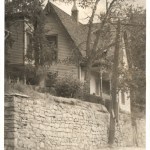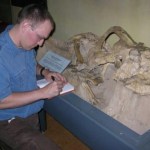Education
Attention conservation notice: A couple thousand words of reply to questions about why I think NCSE does what it does, delivered in my capacity as a random blogger not as an NCSE staffer. People who don't care about accommodationism or about how I read the NCSE website should probably just go back to pondering diehard scientists.
In comments at Larry Moran's blog, I noted what I regard as a serious error in his description of NCSE's position about science and religion. He initially claimed "As you know, it's the official position of the National Center for Science Education" that "science…
This is the third and final part of a multi-part presentation of a sample chapter from a forthcoming book, The Madame Curie Complex. Part One can be found here. Part Two can be found here.
Recently I was approached with an offer to share with my readers a sample chapter from a forthcoming book called The Madame Curie Complex: The Hidden History of Women in Science. A caveat: I have not read the whole book, and offering the sample chapter here for you to read does not constitute an endorsement by me of the book. But I was sufficiently intrigued by the sample chapter I read to think it…
This is part one of a multi-part presentation of a sample chapter from a forthcoming book, The Madame Curie Complex. Part Two can be found here. Part Three can be found here.
This is something a little different for TSZ. Recently I was approached with an offer to share with my readers a sample chapter from a forthcoming book called The Madame Curie Complex: The Hidden History of Women in Science. A caveat: I have not read the whole book, and offering the sample chapter here for you to read does not constitute an endorsement by me of the book. But I was sufficiently intrigued by the…
A recurring theme here on Aard is my complaints about how useless certain kinds of higher education are if you want a job. For a change, let's take a look at what kind of degree is most likely to get you a job in Sweden over the coming decade. The Swedish National Agency for Higher Education has just published a study that offers data on this very issue. Here are the degrees where there will be a labour shortage in Sweden for the foreseeable future!
Medical laboratory scientist, Sw. biomedicinsk analytiker
High-school teacher of manual skills for craftspeople such as carpenters and plumbers…
Last week, the New York Times college admissions and aid blog, The Choice, solicited readers for questions on US historically-black colleges and universities (HBCUs). These 105 HBCUs, primarily in the southern US, were defined by the Higher Education Act of 1965 as institutions of higher learning established prior to 1964 whose principal mission was and is the education of black Americans.
Answering questions received last week are African-American education expert, Dr. Marybeth Gasman, of the University of Pennsylvania and Dr. Walter Kimbrough, president of Philander Smith College, a private…
This post is the second in a series on the origin and history of HeLa S3 cells. The first post can be found here. In this post, we discuss the life and careers (yes, careers) of the remarkable physician-scientist, Florence Rena Sabin.
"Too bad you're not a boy, you would have made a good doctor."
Florence Rena Sabin was born in the mining town of Central City, Colorado, on November 9, 1871, two years after her sister and lifelong companion, Mary. Florence's father. George Sabin, had moved from Vermont to Colorado in the midst of the Colorado gold rush and a notable 1859 gold strike between…
Continuing with the tradition from last two years, I will occasionally post interviews with some of the participants of the ScienceOnline2010 conference that was held in the Research Triangle Park, NC back in January. See all the interviews in this series here. You can check out previous years' interviews as well: 2008 and 2009.
Today, I asked Andy Farke from the Raymond M. Alf Museum of Paleontology in Claremont, CA to answer a few questions.
Welcome to A Blog Around The Clock. Would you, please, tell my readers a little bit more about yourself? Where are you coming from (both…
Leslie Kaufman in the New York Times presents a disturbing tale of attempts by creationists to up their chances of slipping religion into science classrooms by piggy-backing it onto "balanced" instruction of climatology.
The linkage of evolution and global warming is partly a legal strategy: courts have found that singling out evolution for criticism in public schools is a violation of the separation of church and state. By insisting that global warming also be debated, deniers of evolution can argue that they are simply championing academic freedom in general.
Yet they are also capitalizing…
Update: Also see follow up post.
My previous post where I point to Satoshi Kanazawa's finding that liberals & atheists are smarter than conservatives & the religious was a little drop in the bucket in the blogospheric debate. I made it rather obvious that I wasn't too interested in the evolutionary psychological model of why these patterns exist, rather, I was curious about the patterns themselves. The reason is the one Tom Rees elucidates:
What's got people talking is the correlation between atheism and intelligence, although that isn't what the paper is actually about. It's already…
Continuing with the tradition from last two years, I will occasionally post interviews with some of the participants of the ScienceOnline2010 conference that was held in the Research Triangle Park, NC back in January. See all the interviews in this series here. You can check out previous years' interviews as well: 2008 and 2009.
Today, I asked Andrea Novicki from the Duke CIT blog to answer a few questions.
Welcome to A Blog Around The Clock. Would you, please, tell my readers a little bit more about yourself? Where are you coming from (both geographically and philosophically)? What is your…
The inaugural Canadian Engineering Education Association Conference will be held this year from June 7-9 at Queen's University in Kingston, Ontario.
The Canadian Engineering Education Association (CEEA) is a new organization whose mission is to "enhance the competence and relevance of graduates from Canadian Engineering schools through continuous improvement in engineering education and design education." This first annual CEEA conference will integrate and grow on the previous efforts of the Canadian Design Engineering Network (CDEN) and the Canadian Congress on Engineering Education (C2E2…
I spent a lot of time writing about animal rights extremists who have threatened to harass the children of an investigator whom they view as a "vivisector" and how they fetishize the very violence they decry. Unfortunately, I was disappointed to see that a fellow ScienceBlogger, namely Eric Michael Johnson of The Primate Diaries, appears to share some of the scientific misconceptions that the animal rights extremists when he prefaces an Open Letter to the Animal Liberation Front with:
Vivisection, or what in polite society is merely called animal experimentation, is a barbaric practice that…
A few weeks ago, I wrote a post about being stricken with pneumonia and my reflections on what it must be like for people who live continually with chronic illnesses. I was surprised by the response from many readers, quite a few of whom I've never seen comment here, who voiced understanding and even relief that a "normal" would take the time to reflect on what their life might be like.
Well, my illness is continuing even longer than my pulmonologist had expected and this has evoked for me a whole new layer of emotions. I write the following not for sympathy or concern, but rather for the…
The School of Communication at American University in partnership with the School of Public Affairs has established a new 2 year MA degree program in Political Communication. The program is currently accepting applications for Fall 2010. Follow this link and see details posted below.
The joint SOC/SPA degree is one of several new programs moving forward at AU, as the university and School of Communication pursue an ambitious new strategic plan.
The Master of Arts in Political Communication is a 36 credit hour degree program combining education in political sciences and communication,…
Last week I presented at a workshop hosted by AAAS on "Promoting Climate Literacy Through Informal Science." There were a number of outstanding presentations and themes discussed including a plenary talk by historian Naomi Oreskes detailing the central arguments of her forthcoming book on the origins of the climate skeptic movement.
There are plans to make available online the various presentation materials, so I will post again when those are ready. In the meantime, I have pasted below the text from remarks I gave as part of a panel on framing. These remarks also follow closely some of…
From the NCSE:
OAKLAND, CA February 23, 2010
They came from Texas. Big, brawny men, with big, brawny brains. They had a mission: To make evolution education safe for kids throughout the Republic of Texas.
These three men--David Hillis, Gerald Skoog and Ron Wetherington---stood tall for evolution!
In recognition of their decades of defending and promoting evolution, the National Center for Science Education has bestowed the 2010 "Friend of Darwin" award on three Texans who have fought the good fight for science. (To get a taste of what they've faced, go to http://ncse.com/news/texas.)
The…
When I told you about the infuriating tactics extreme animal rights activists are turning against Dario Ringach for even daring to express his view that animal research can be important, a number of you asked in the comments, "What can we do besides signing petitions and writing blog posts?"
David Jentsch offers some concrete ideas about where to start making your stand:
For those that support research or researchers, I offer a number of possibilities that will allow you to become involved in this struggle:
1) Participate however you can in supporting science and scientists. This may…
Continuing with the tradition from last two years, I will occasionally post interviews with some of the participants of the ScienceOnline2010 conference that was held in the Research Triangle Park, NC back in January. See all the interviews in this series here. You can check out previous years' interviews as well: 2008 and 2009.
Today, I asked my SciBling Dorothea Salo to answer a few questions.
Here are the questions. No rush. Remember that you are free to add, delete, fuse, split or edit the questions:
Welcome to A Blog Around The Clock. Would you, please, tell my readers a little bit more…
I grew up in the days of the SNES and the Sega Megadrive. Even then, furious debates would rage about the harm (or lack thereof) that video games would inflict on growing children. A few decades later, little has changed. The debate still rages, fuelled more by the wisdom of repugnance than by data. With little regard for any actual evidence, pundits like Baroness Susan Greenfield, former Director of the Royal Institution, claim that video games negatively "rewire" our brains, infantilising us, depriving us of our very identities and even instigating the financial crisis.
Of course, the fact…
By email, a reader asks for advice on a situation in which the personal and the professional seem like they might be on a collision course:
I am a junior at a small (< 2000 students) liberal arts college. I got recruited to be a TA for an upper division science class, and it's going swimmingly. I'm basically a troubleshooter during labs, which the professor supervises. The problem is that I've fallen for one of the students, also a junior. Is it possible for me to ethically date her? The university's handbooks are little help--sexual harassment is very strictly prohibited, but even faculty…



